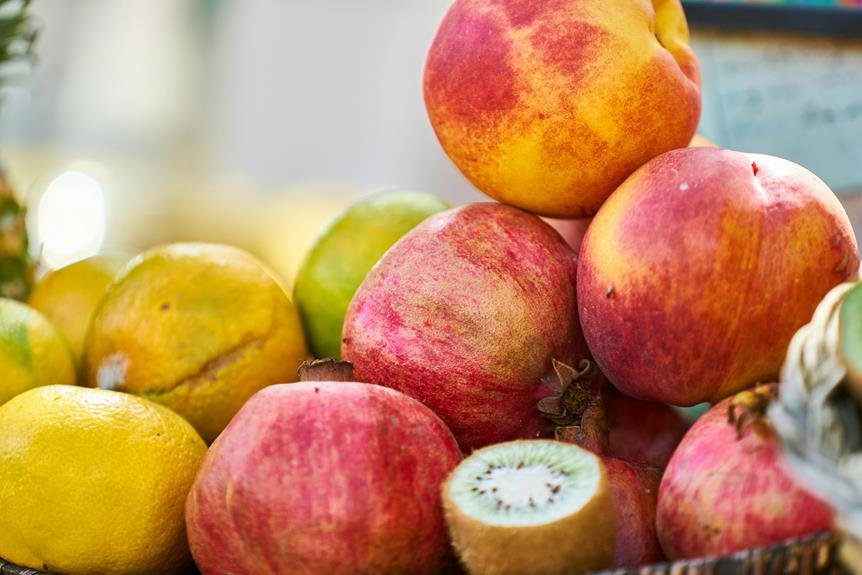
When it comes to gut health and immunity, fiber is a key player that shouldn't be overlooked. You might be surprised to learn just how much of an impact fiber can have on your overall well-being. From promoting a healthy gut microbiome to bolstering your body's defense mechanisms, the benefits of fiber extend far beyond what meets the eye. So, how exactly does fiber work its magic in supporting your gut and immune system? Let's uncover the fascinating relationship between fiber, gut health, and immunity together.
Importance of Fiber in Gut Health
Improving gut health relies heavily on consuming an adequate amount of fiber-rich foods daily. Fiber plays a crucial role in maintaining a healthy digestive system by promoting regular bowel movements and supporting the growth of beneficial gut bacteria. When you consume enough fiber, it helps to prevent constipation and promotes overall gut motility, aiding in the efficient removal of waste and toxins from your body.
Additionally, fiber acts as a prebiotic, which means it provides fuel for the good bacteria in your gut. These beneficial bacteria play a significant role in supporting your immune system, regulating inflammation, and promoting optimal nutrient absorption. By nourishing these friendly microbes with fiber, you create a balanced and diverse gut microbiome, which is essential for overall health and well-being.
Furthermore, fiber helps to maintain a healthy weight by promoting feelings of fullness and reducing overeating. It also supports heart health by lowering cholesterol levels and improving blood sugar control. Therefore, incorporating a variety of fiber-rich foods such as fruits, vegetables, whole grains, nuts, and seeds into your daily diet is essential for promoting optimal gut health and overall wellness.
Impact of Fiber on Immunity
Consuming an adequate amount of fiber is crucial for bolstering your immunity and maintaining overall health. Fiber plays a significant role in supporting your immune system by promoting the growth of beneficial gut bacteria. These good bacteria help prevent harmful pathogens from flourishing in your intestines, thus reducing the risk of infections.
Furthermore, fiber aids in reducing inflammation in the body, which is essential for a robust immune response. By promoting a healthy inflammatory balance, fiber helps your immune system function optimally. Additionally, fiber supports the production of short-chain fatty acids in the gut, which play a vital role in immune regulation.
Studies have shown that individuals who consume sufficient fiber have a more robust immune response to pathogens. By including a variety of fiber-rich foods in your diet, such as fruits, vegetables, whole grains, and legumes, you can positively impact your immune function and overall well-being. Remember, a healthy gut supported by adequate fiber intake is key to a strong immune system.
Fiber-Rich Foods for Gut Health
Optimizing your gut health can be achieved through incorporating a variety of fiber-rich foods into your daily diet. Fiber plays a crucial role in maintaining a healthy gut environment by promoting digestion, supporting beneficial gut bacteria, and preventing digestive issues.
Including fruits like apples, berries, and pears in your meals provides soluble fiber that helps regulate bowel movements and feeds good bacteria in the gut. Vegetables such as broccoli, carrots, and Brussels sprouts are rich in insoluble fiber, which adds bulk to the stool and promotes regularity.
Whole grains like oats, quinoa, and brown rice are excellent sources of fiber that support overall gut health. Legumes such as lentils, chickpeas, and black beans are also high in fiber and help in maintaining a balanced gut microbiome.
Strategies to Increase Fiber Intake
To boost your fiber intake effectively, consider practical ways to incorporate more fiber-rich foods into your daily meals. Start your day with a fiber-packed breakfast by adding fruits like berries or bananas to your cereal or yogurt.
Snack on raw vegetables like carrots, bell peppers, or cucumbers with hummus or nut butter for a midday fiber boost.
When preparing meals, opt for whole grains such as brown rice, quinoa, or whole wheat pasta instead of refined grains.
Include legumes like lentils, chickpeas, or black beans in soups, salads, or as a side dish to increase your fiber consumption.
Adding seeds like chia, flax, or pumpkin seeds to smoothies, yogurt, or oatmeal can also contribute to your daily fiber intake.
Remember to gradually increase fiber intake and drink plenty of water throughout the day to help with digestion.




